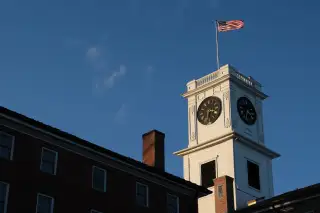Amherst College No Longer Cares If Your Parents Went There

Don't expect any more favors from the College of Mom and Dad. Amherst College is ending its use of legacy admissions, a policy that for decades has given a leg up to applicants who are the children of alumni.
It's a move that aims to make the admissions process fairer for lower-income students and those who are the first in their families to go to college. Other universities with low acceptance rates have committed to expanding access to those groups of students, but Amherst is among the first to take this particular step.
“Now is the time to end this historic program that inadvertently limits educational opportunity,” Biddy Martin, president of the private liberal arts college, said in a press release. “We want to create as much opportunity for as many academically talented young people as possible, regardless of financial background or legacy status."
The college admitted 11% of applicants last year, making it one of the most competitive colleges in the country. On the whole, about 11% of Amherst’s current student body are legacy admits.
Advocates for fairer college admissions have long taken aim at the practice of legacy admissions. Amherst's announcement comes after more intense scrutiny in recent years, and criticism around the college admissions bribery scandal in 2019 and a high-profile trial in 2018 that revealed many details on Harvard University's admissions practices. (A court ruled in favor of Harvard last year.)
Martin, the Amherst president, told the Wall Street Journal, that she recognizes there's a risk some alumni may be offended by this decision. But it's also possible more recent graduates will welcome it: Earlier this year, a Brown University graduate launched a campaign to recruit other young alumni pledging not to donate to their alma maters until they eliminate legacy admissions.
The boost that legacy status provides can be significant at colleges that reject tens of thousands of applicants every year. One researcher has estimated, based on a sampling of colleges that used legacy admissions, that children of alumni are about three times more likely to be admitted than their non-legacy peers.
That reinforces inequities in higher education by helping white and wealthy students, whose families have had access to college for generations, according to the Institute for Higher Education Policy. The nonprofit research organization pushed for ending legacy admissions this year as part of a report on more equitable recruitment and admissions practices.
Could the end of legacy admissions at Amherst start a trend?
Johns Hopkins University in Baltimore ended legacy admissions in 2019, and other elite colleges, including the Massachusetts Institute of Technology and California Institute of Technology, do not consider legacy status. Earlier this year, Colorado Gov. Jared Polis signed a law that bans legacy admissions at state colleges and universities.
But those colleges are more the exception than the rule. Roughly four in 10 private, nonprofit colleges consider legacy status in their admissions decisions, according to a 2019 report from the American Association of Collegiate Registrars and Admissions Officers. And the practice is more common at the colleges that are hardest to get into — about 75% of colleges that admit fewer than a quarter of applicants consider legacy status. (About 14% of public universities do.)
Amherst’s policy change, which comes with a roughly 18% increase in financial aid for low- and middle-income students, may push other competitive liberal arts colleges (like the nearby Williams College) to re-consider their legacy applicants. But Amherst alone is unlikely to bring a quick downfall to a practice with long roots in higher education: College officials who’ve defended legacy admissions say that the applicants who are admitted as legacies are no less qualified than others, and that the policy is important for alumni relations and fundraising.
With the increased financial aid, Amherst estimates it will be able to offer scholarships to about 60% of the student body, and that one in six current students will see their aid increase by more than $5,000 a year.
More from Money:
Does College Really Pay off? 16% of High School Grads Earn More Than Many Workers With Bachelor's Degrees
The College Admission Process Is Already Rigged to Favor the Rich. Here's How